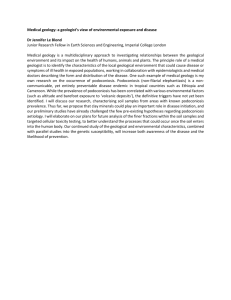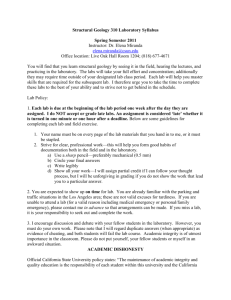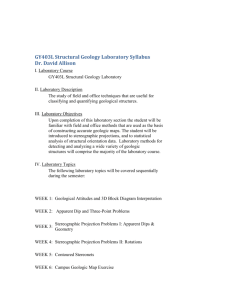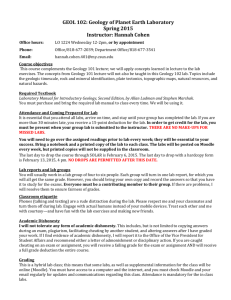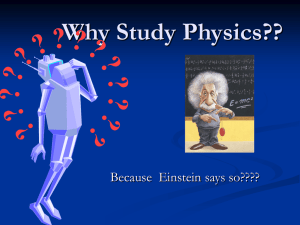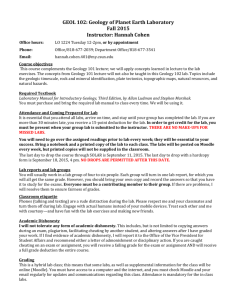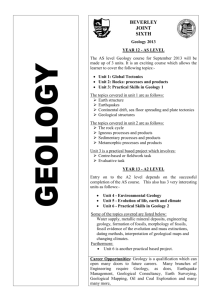Structural Geology course outline
advertisement
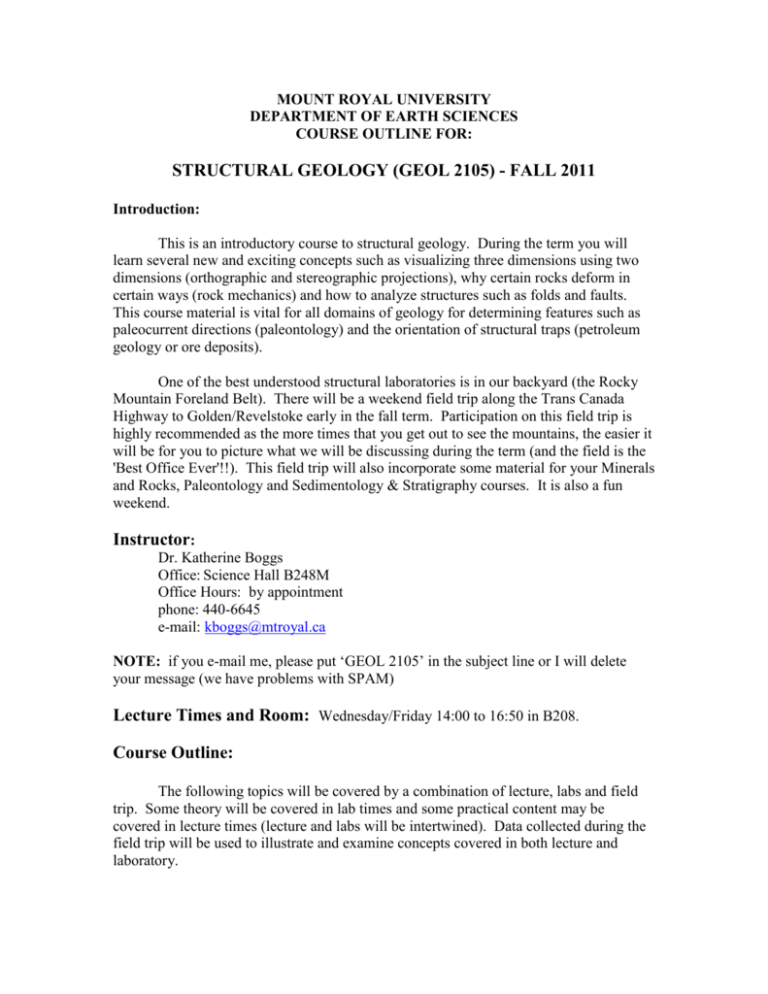
MOUNT ROYAL UNIVERSITY DEPARTMENT OF EARTH SCIENCES COURSE OUTLINE FOR: STRUCTURAL GEOLOGY (GEOL 2105) - FALL 2011 Introduction: This is an introductory course to structural geology. During the term you will learn several new and exciting concepts such as visualizing three dimensions using two dimensions (orthographic and stereographic projections), why certain rocks deform in certain ways (rock mechanics) and how to analyze structures such as folds and faults. This course material is vital for all domains of geology for determining features such as paleocurrent directions (paleontology) and the orientation of structural traps (petroleum geology or ore deposits). One of the best understood structural laboratories is in our backyard (the Rocky Mountain Foreland Belt). There will be a weekend field trip along the Trans Canada Highway to Golden/Revelstoke early in the fall term. Participation on this field trip is highly recommended as the more times that you get out to see the mountains, the easier it will be for you to picture what we will be discussing during the term (and the field is the 'Best Office Ever'!!). This field trip will also incorporate some material for your Minerals and Rocks, Paleontology and Sedimentology & Stratigraphy courses. It is also a fun weekend. Instructor: Dr. Katherine Boggs Office: Science Hall B248M Office Hours: by appointment phone: 440-6645 e-mail: kboggs@mtroyal.ca NOTE: if you e-mail me, please put ‘GEOL 2105’ in the subject line or I will delete your message (we have problems with SPAM) Lecture Times and Room: Wednesday/Friday 14:00 to 16:50 in B208. Course Outline: The following topics will be covered by a combination of lecture, labs and field trip. Some theory will be covered in lab times and some practical content may be covered in lecture times (lecture and labs will be intertwined). Data collected during the field trip will be used to illustrate and examine concepts covered in both lecture and laboratory. a) b) c) d) e) f) g) h) Classification and recognition of plate boundaries and orogenic belts Orthographic projections Stereographic projections Construction and interpretation of geological maps Construction of geological cross sections Rock mechanics, stress and strain Folds, faults and fractures Mesoscopic and microscopic structures NOTE: Much of this material builds on what you have learned in your Introductory Field School and in GEOL 1101/1103. This material will also be useful for your future courses in the BSc Geology Major degree and as professional geologists. University-wide Learning Outcomes: Mount Royal University has identified six university-wide learning outcomes that it believes are critical in order to prepare its graduates for workplace success and a life of continuous learning. These include: Thinking Skills, Communication, Information Access and Retrieval, Ethical Reasoning, Group Effectiveness and Computer Literacy. All courses offered at the university emphasize one or more of these university-wide outcomes. In this course, the university-wide outcomes emphasized are Thinking Skills, Communication, Information Access and Retrieval, and Computer Literacy. Lectures, labs, readings from the text, and discussions with your classmates will assist you in developing your thinking and communication skills. You will be taught how to think in three dimensions, how to plot 3-D in 2-D space, how to use stereonets to solve structural problems and how to analyse geological structures using geological maps and cross sections. These skills will be assessed using field work, labs, and exams. Course Learning Outcomes: Successful students in this course will be able to: *accurately describe plate boundaries and orogenic belts *analyse geological structures using maps and cross sections, * use orthographic projections, trigonometric equations and stereonets to represent 3D figures in 2D space and to solve structural problems, *solve problems independently *take responsibility for your individual development as a professional geologist Please take responsibility for your own learning! Structural Geology is a challenging subject that requires most people 4-6 weeks of diligent work to conquer. In order to do so, you will need to complete readings from the textbook (and the target questions), work through class problems, lab problems and extra problems. It is critical that you keep up with the material every day as the next lecture will build on the previous lecture's material. In order to be successful in this course, you will need to work on the material independently outside of the scheduled lab/lectures times. Textbook: 1. Marshak and Mitra, 1998. Basic Methods of Structural Geology, Prentice-Hall, Inc. ISBN: 0-13-065178-8. Partition of Marks: Reading assignments (lab and lecture; on line) **these will be collected randomly at the start of lectures/labs** Labs and two lab quizzes (Week of October 24th and November 21st) Midterm lab/theory exam (Week of November 7th, 3 hours) Lab final exam (December 7, 3 hours) Final exam 15% 35% 15% 15% 20% The final exam will be scheduled by the registrar during the period December 10-21, 2011. The two lab quizzes will each be worth 5% (for a total of 10%). Five labs will be marked (each worth 5%; for a total of 25%)). NOTE: There will be copies of old quiz and exam questions provided on the Blackboard site later in the term. Make-up Exams: For those students who miss an exam and provide a legitimate Medical/Religious excuse, a date will be set aside for them to write a make-up exam. Students MUST inform the instructor BEFORE the date and time of the exam that they (the student) will not be writing. The student shall provide the instructor with a written Medical/Religious excuse at the earliest possible date. Misreading the exam schedule IS NOT considered to be a valid excuse. Grading Schedule: Letter grades will be assigned as follows: A+ A AB+ B B- >90% 85.0% 80.0% 76.5% 73.5% 70.0% - 89.9% 84.9% 79.9% 76.4% 73.4% Policies and Procedures: C+ C CD+ D F 66.5% 63.5% 60.0% 55.0% 50.0% <49.9% 69.9% 66.4% 63.4% 59.9% 54.9% Students are held accountable and responsible for policies outlined in the calendar including the following Mount Royal University policies and procedures: 1. Academic Regulations: Please make yourselves aware of the policies and procedures of Mount Royal University as stated on pages 32-37 in the current calendar. Deferred exam policy refers to both final and mid-term exams. 2. Students' Rights and Responsibilities: The Statement of Students' Rights and Responsibilities are on pages 39 - 40 of the current calendar. Please read. 3. Withdrawal Date Students not intending to complete the course must withdraw on or before November 18, 2011 in order to receive a 'W' grade. If this deadline is missed the student will receive an 'F' grade. 4. Academic Integrity: Academic dishonesty consists of misrepresentation by deception or by other fraudulent means and can result in serious consequences, e.g. the grade of zero on an assignment, loss of credit with a notation on the transcript, and/or suspension or expulsion from the university. It is your responsibility to understand what constitutes academic dishonesty. For information on the various kinds of academic dishonesty please refer to the Code of Student Conduct at: http://www.mtroyal.ca/codeofstudentconduct/CodeofStudentConduct.pdf The following illustrates two forms of academic dishonesty: 1. Plagiarism, e.g. the submission of work that is not one's own or for which other credit has been obtained. 2. Improper collaboration in group work (e.g. submitting the same figures and/or wording as your partner; including those that have the same errors). It is highly recommended that you consult the “Avoiding Plagiarism” link on the library website: http://library.mtroyal.ca/help/citation/plagiarism.shtml Policies for this course: 5. Class Room Rules - Please be respectful of faculty and fellow students: turn off cell phones sneak in quietly if late for class concentrate on class activities (do not listen to head phones, do not work on labs/other materials during lecture) close computers during lectures NO playing with phones, IPods or other electronic devices during class time 6. Room B208 – Second year working space. Please be respectful of your fellow students at all times: Do leave the room for conversations or phone calls Do use your headphones (no music/sounds that can be heard by others) Do be respectful of everyone in this space (read that to be appropriate with your language) Do not permit anyone outside of your fellow second year BSc Geology Major students to work in this space (it is your space, not their’s) LABS BEGIN SEPTEMBER 14th For the labs you will need (bring to all lectures/labs): calculator ruler with mm and cm divisions protractor (square, 0 to 360º navigational protractor) pencils (2H or 3H) eraser coloured pencils Wulff stereonet (provided in lab later in term) tracing paper paper - lined and graph Field Trip There will be a weekend field trip along the Trans Canada Highway between Calgary and Golden/Revelstoke. We will stay overnight in Golden, BC. Submission of a $20 down payment will reserve your spot for the field trip. Participation in this weekend is highly recommended as the more you see the rocks, the easier it will be to visualize what we are discussing during the term (and it is fun too).
